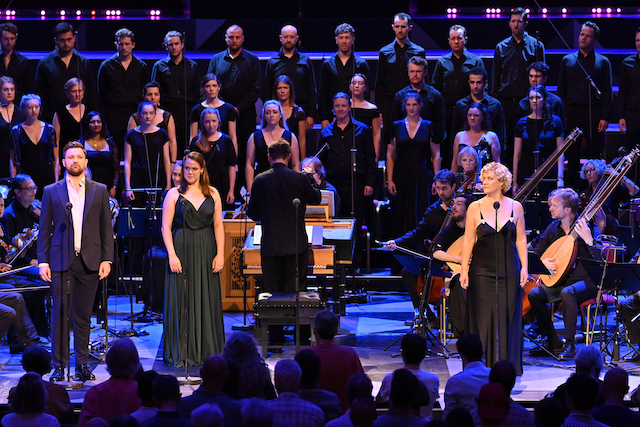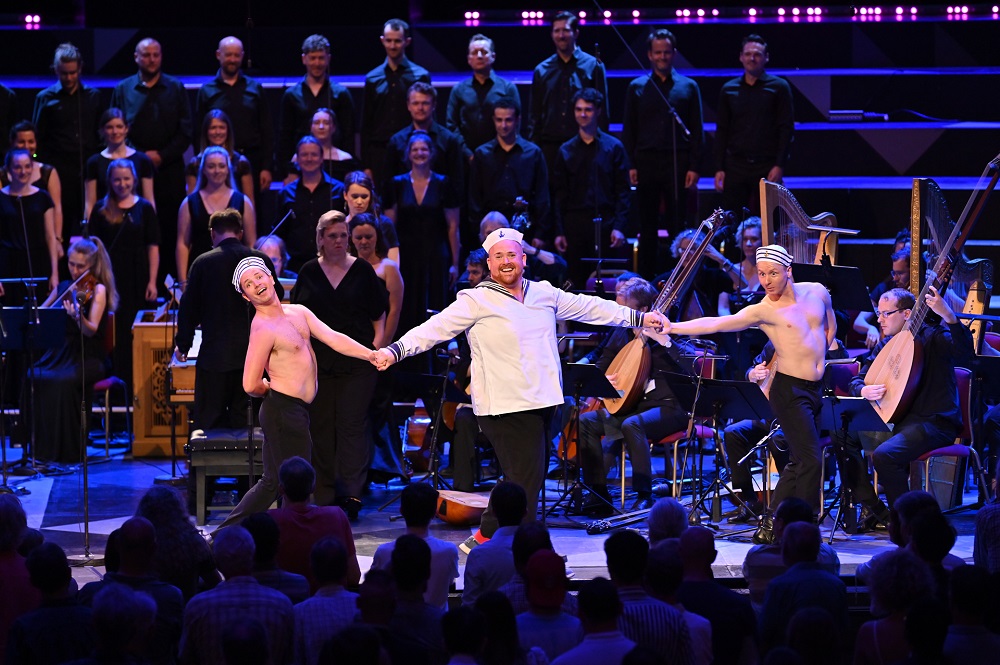Prom 7, Dido and Aeneas, La Nuova Musica review - bold and original from the start | reviews, news & interviews
Prom 7, Dido and Aeneas, La Nuova Musica review - bold and original from the start
Prom 7, Dido and Aeneas, La Nuova Musica review - bold and original from the start
Levity as well as sadness from David Bates' ensemble, searing intensity from Alice Coote
How do you celebrate one of epic poetry’s richest female characters, a queen renowned across the Middle East and North Africa for being as politically powerful as she was magnetic? For Nahum Tate, the librettist for Dido and Aeneas, the curious answer is to push aside Dido’s achievements as a ruler and city builder and replace Virgil’s stirring metaphor for her plight with something, well, a little tamer.
It’s no small part of the great achievement of Purcell’s score that it takes Tate’s frankly mediocre poetry and through harmonic and rhythmic innovation transforms the base metal of his words into the gold standard of the Latin original. In a stirring performance last night at the Proms – fusing thoughtfulness and playfulness, dignity and anguish – La Nuova Musica, conducted from the harpsichord by David Bates, revealed once more why Dido remains a great tragic figure for our times.
The bold intelligence of this interpretation – which marked the group’s début at the Proms – was clear right from the start as the Lento section of the Lully-influenced overture was played with a mellifluous lyricism that eclipsed the rhythmic formality. It was only in the repeat – which came across almost as an angry retort to the opening – that the dotted rhythms were vigorously asserted, before a dynamic Allegretto moderato section in which the notes interwove as deftly as a flock of birds.
The mezzo-soprano Alice Coote took the role of Dido, moving back and forth across the stage with an agonised distraction that demonstrated, even before she sang, both the conflict and profundity of her emotions. Bates directed the orchestra so that there was a lengthy silence between the chorus and Coote’s first note; when it came it was simultaneously an expression of dignity and undiluted pain. Famously Dido’s first scene is in C minor to underscore the foreboding she feels about letting her guard down with Aeneas. Coote heightened this both through the searing intensity of her sustained notes and through her subtle emphasis of linguistic echoes like the “anguish” in “languish”. 
Her great love interest, Aeneas, was played last night by the baritone James Newby (pictured above with Summerfield and Coote), a former BBC New Generation Artist and Rising Star for the Orchestra of the Age of Enlightenment. Newby is no stranger to innovation; on his website you can watch an extraordinary video in which he performs Handel’s "Cara pianta" from Apollo e Dafne while being half drowned in a diver’s helmet, as a direct tribute to Radiohead’s Thom Yorke in No Surprises. Here, however, he embraced Aeneas’s emotional detachment a little too much – next to Dido and Belinda he seemed a bit of a stuffed shirt. It was only towards the end that the full expressiveness of his rich voice allowed him to seem more than a cipher for higher forces.
Tate’s great innovation, of course, was to replace the battle between Venus and Juno in Virgil’s original with a plot led by witches. Tate’s innovations were frequently dubious; this is, after all, the man who gave the world King Lear with a happy ending, and also translated a paper on syphilis into heroic rhyming couplets. La Nuova Musica, however, have heightened this element of the work with a serious exploration of the emotions that might have shaped women seen as outsiders in society at the time. Madeleine Shaw was a powerfully angry sorceress while Helen Charlston’s delivery as first witch was thrillingly elemental. 
"When I am laid in earth" is always going to be the focal point in any production of this opera, and Coote delivered it in a way that showed that Dido had never been more alive than at the point of her destruction. There was a simultaneous fluidity of expression and resolute stillness at the heart of her performance. As she sang “Remember me” the notes conveyed the full complexity and resonance of her grief. You could imagine them echoing across the wine-dark sea as Aeneas sped away in his relentless quest to be a hero.
rating
Explore topics
Share this article
The future of Arts Journalism
You can stop theartsdesk.com closing!
We urgently need financing to survive. Our fundraising drive has thus far raised £49,000 but we need to reach £100,000 or we will be forced to close. Please contribute here: https://gofund.me/c3f6033d
And if you can forward this information to anyone who might assist, we’d be grateful.

Subscribe to theartsdesk.com
Thank you for continuing to read our work on theartsdesk.com. For unlimited access to every article in its entirety, including our archive of more than 15,000 pieces, we're asking for £5 per month or £40 per year. We feel it's a very good deal, and hope you do too.
To take a subscription now simply click here.
And if you're looking for that extra gift for a friend or family member, why not treat them to a theartsdesk.com gift subscription?

Add comment